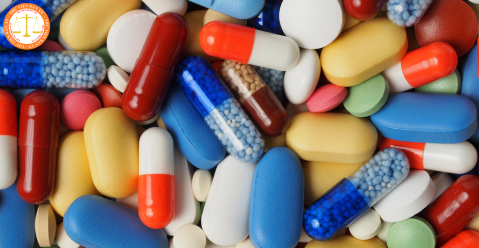List of 30 medicines required to be prescribed and temporarily sold by prescription in Vietnam

List of 30 medicines required to be prescribed and temporarily sold by prescription in Vietnam
According to the guidelines for implementing the regulations on medication prescription in outpatient treatment in Official Dispatch 1517/BYT-KCB 2008 concerning the list of medicines that must be prescribed and sold by prescription temporarily as follows:
(1) Narcotics;
(2) Psychotropic substances and precursors used as drugs;
(3) Anesthetics;
(4) Non-steroidal anti-inflammatory drugs, excluding acetylsalicylic acid (Aspirin) and paracetamol;
(5) Medications for the treatment of Gout;
(6) Emergency and detoxification drugs;
(7) Medications for treating filariae, flukes;
(8) Antibiotics;
(9) Antiviral medications;
(10) Antifungal medications;
(11) Tuberculosis treatment medications;
(12) Malaria treatment medications;
(13) Medications for the treatment of migraines;
(14) Cancer treatment and immune system affecting medications;
(15) Parkinson's treatment medications;
(16) Medications affecting blood coagulation;
(17) Blood, blood derivatives, high molecular weight solutions;
(18) Cardiovascular medication group: coronary disease treatment drugs, anti-arrhythmic drugs, hypertension treatment drugs, hypotension treatment drugs, heart failure treatment drugs, antithrombotic drugs, lipid-lowering drugs;
(19) Drugs for diagnostic purposes;
(20) Diuretics;
(21) Anti-ulcer medication: H2 histamine antagonists, proton pump inhibitors;
(22) Hormones (corticosteroids, insulin and anti-hyperglycemic groups, etc.) and hormones (except contraceptive drugs);
(23) Serums and immune globulins;
(24) Muscle relaxants and muscle tone enhancers;
(25) Drugs that constrict or dilate pupils and reduce intraocular pressure;
(26) Labor-inducing drugs, post-delivery hemostatic drugs, and anti-premature birth drugs;
(27) Asthma treatment medications;
(28) Biologicals used for treatment (excluding digestive enzymes);
(29) Erectile dysfunction treatment drugs;
(30) Intravenous infusion solutions.
What are the principles of prescribing chemical drugs, biologicals in outpatient treatment in Vietnam?
According to Article 4 of Circular 52/2017/TT-BYT on the principles of prescribing chemical drugs, biologicals in outpatient treatment at medical examination and treatment facilities as follows:
- Prescription is allowed only after the results of medical examination and disease diagnosis are available.
- The prescribed medication must be suitable for the diagnosis and severity of the disease.
- The prescription goal must ensure safety, rationality, and effectiveness. Prioritize prescribing monocomponent drugs or generic drugs.
- The prescription must be in accordance with one of the following documents:
+ Diagnosis and treatment guidelines or HIV/AIDS treatment and care guidelines issued or recognized by the Ministry of Health; diagnosis and treatment guidelines of the examination and treatment facility constructed as per Article 6 Circular 21/2013/TT-BYT by the Minister of Health regulating the organization and operation of the Medication and Treatment Council in hospitals in cases where there is no Ministry of Health-issued diagnosis and treatment guideline.
+ Drug use instructions attached to drugs that have been licensed for circulation.
+ The National Pharmacopoeia of Vietnam;
- The number of drugs prescribed is to be implemented according to the Diagnosis and Treatment Guidelines specified at Point a, Clause 4, Article 4 of Circular 52/2017/TT-BYT or sufficient for use but not exceeding 30 (thirty) days, except for cases specified in Articles 7, 8, and 9 of Circular 52/2017/TT-BYT.
- For patients who must undergo examination by 3 or more specialties in one day, the head of the medical examination and treatment facility or the person authorized by the head (head of the examination department, head of clinical department) or the medical professional in charge of the facility after reviewing examination results of the specialties, directly prescribes or assigns a suitably specialized doctor to prescribe for the patient.
- Doctors, physician assistants at level 4 medical examination and treatment facilities are allowed to conduct general medical examinations and treatments and prescribe medications for all specialties listed in the technical list at level 4 (the technical list of the examination and treatment facility approved by the competent authority).
- In emergency cases, doctors, physician assistants prescribed in Clauses 1, 2, Article 2 of Circular 52/2017/TT-BYT can prescribe medications for emergency management, suitable to the patient's condition.
- It is prohibited to prescribe drugs that contain the contents specified in Clause 15, Article 6 of the Pharmacy Law, specifically:
+ Drugs or substances not intended for the purpose of disease prevention, treatment;
+ Drugs not legally approved for circulation in Vietnam,
+ Functional foods;
+ Cosmetics.
Thus, the principles of prescribing chemical drugs and biologicals in outpatient treatment are detailed in Article 4 of Circular 52/2017/TT-BYT. Key principles include prescribing only after examination and diagnosis; ensuring safety, rationality, and effectiveness; adhering to treatment guidelines and instructions; limiting the number of medications prescribed;...
Please Login to be able to download





